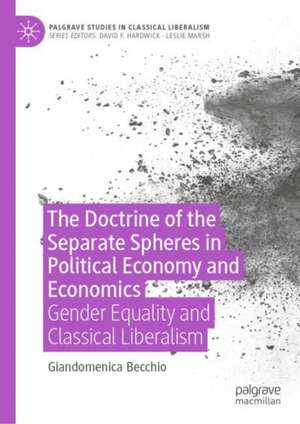The Doctrine of the Separate Spheres in Political Economy and Economics: Gender Equality and Classical Liberalism: Palgrave Studies in Classical Liberalism
Autor Giandomenica Becchioen Limba Engleză Hardback – mar 2024
Din seria Palgrave Studies in Classical Liberalism
- 20%
 Preț: 567.80 lei
Preț: 567.80 lei -
 Preț: 319.90 lei
Preț: 319.90 lei - 20%
 Preț: 689.03 lei
Preț: 689.03 lei - 17%
 Preț: 360.47 lei
Preț: 360.47 lei -
 Preț: 252.24 lei
Preț: 252.24 lei - 18%
 Preț: 729.36 lei
Preț: 729.36 lei - 15%
 Preț: 695.34 lei
Preț: 695.34 lei - 15%
 Preț: 582.80 lei
Preț: 582.80 lei - 15%
 Preț: 696.50 lei
Preț: 696.50 lei - 15%
 Preț: 640.24 lei
Preț: 640.24 lei -
 Preț: 450.71 lei
Preț: 450.71 lei - 15%
 Preț: 698.30 lei
Preț: 698.30 lei - 15%
 Preț: 640.88 lei
Preț: 640.88 lei - 15%
 Preț: 703.52 lei
Preț: 703.52 lei - 15%
 Preț: 695.48 lei
Preț: 695.48 lei - 15%
 Preț: 700.61 lei
Preț: 700.61 lei - 18%
 Preț: 723.24 lei
Preț: 723.24 lei - 18%
 Preț: 894.97 lei
Preț: 894.97 lei - 15%
 Preț: 527.32 lei
Preț: 527.32 lei - 15%
 Preț: 640.24 lei
Preț: 640.24 lei - 15%
 Preț: 468.25 lei
Preț: 468.25 lei - 15%
 Preț: 638.76 lei
Preț: 638.76 lei - 15%
 Preț: 697.32 lei
Preț: 697.32 lei - 15%
 Preț: 696.02 lei
Preț: 696.02 lei - 15%
 Preț: 700.61 lei
Preț: 700.61 lei -
 Preț: 386.00 lei
Preț: 386.00 lei - 15%
 Preț: 643.65 lei
Preț: 643.65 lei -
 Preț: 487.96 lei
Preț: 487.96 lei - 15%
 Preț: 478.57 lei
Preț: 478.57 lei - 15%
 Preț: 692.24 lei
Preț: 692.24 lei - 18%
 Preț: 896.84 lei
Preț: 896.84 lei - 18%
 Preț: 1001.19 lei
Preț: 1001.19 lei -
 Preț: 394.12 lei
Preț: 394.12 lei
Preț: 730.16 lei
Preț vechi: 890.44 lei
-18% Nou
Puncte Express: 1095
Preț estimativ în valută:
139.73€ • 145.70$ • 116.13£
139.73€ • 145.70$ • 116.13£
Carte tipărită la comandă
Livrare economică 20 martie-03 aprilie
Preluare comenzi: 021 569.72.76
Specificații
ISBN-13: 9783031512612
ISBN-10: 3031512618
Ilustrații: IX, 295 p. 1 illus.
Dimensiuni: 148 x 210 mm
Greutate: 0.52 kg
Ediția:2024
Editura: Springer International Publishing
Colecția Palgrave Macmillan
Seria Palgrave Studies in Classical Liberalism
Locul publicării:Cham, Switzerland
ISBN-10: 3031512618
Ilustrații: IX, 295 p. 1 illus.
Dimensiuni: 148 x 210 mm
Greutate: 0.52 kg
Ediția:2024
Editura: Springer International Publishing
Colecția Palgrave Macmillan
Seria Palgrave Studies in Classical Liberalism
Locul publicării:Cham, Switzerland
Cuprins
PART I: Escaping the doctrine of the separate spheres (1700s-early 1900s). The economists’ points of view.- Chapter 1: Educated women as an asset to society: the role of classical liberal tradition in modern Europe.- Chapter 2: Women and the job market in Victorian England and Progressive America.- Chapter 3: Women’s new path towards the public sphere.- Part II: The doctrine of the separate spheres between rebirth and rejection (1920s- early 2000s). Marriage theory in economics.- Chapter 4: Reviving the doctrine of separate spheres: the new home economics.- Chapter 5: Feminist economics and the doctrine of the separate spheres.
Notă biografică
Giandomenica Becchio is Associate Professor at the Department of Economics, Social Sciences, Mathematics and Statistics (ESOMAS), University of Torino, Italy. Her research encompasses the history of economic thought, with a specific emphasis on gender issues, as well as the methodology of economics and the classical liberal tradition within political economy.
Textul de pe ultima copertă
This book delves into the doctrine of separate spheres within the history of economic thought. The concept of separate spheres emerged in philosophy and has consistently been incorporated by various disciplines. This book stands as the first comprehensive exploration of how this doctrine was embraced, adapted, and contested by economists engaged in gender issues and marriage theory. Spanning the late eighteenth to the early twentieth century, it illuminates the evolution of the drive for gender equality—rooted primarily in the tradition of classical liberalism—across the landscape of economic ideas and theories. This book is a valuable resource for scholars and researchers interested in the intricate history of the interconnections among between economic thought, feminism, gender studies, and cultural studies.
Giandomenica Becchio is Associate Professor at the Department of Economics, Social Sciences, Mathematics and Statistics (ESOMAS), University of Torino, Italy. Her research encompasses the history of economic thought, with a specific emphasis on gender issues, as well as the methodology of economics and the classical liberal tradition within political economy.
Giandomenica Becchio is Associate Professor at the Department of Economics, Social Sciences, Mathematics and Statistics (ESOMAS), University of Torino, Italy. Her research encompasses the history of economic thought, with a specific emphasis on gender issues, as well as the methodology of economics and the classical liberal tradition within political economy.
Caracteristici
Applies an economic analysis of the doctrine of the separate spheres Fills a gap in the history of economic thought and the role of women Shows how gender equality is linked to the principles of classical liberalism
